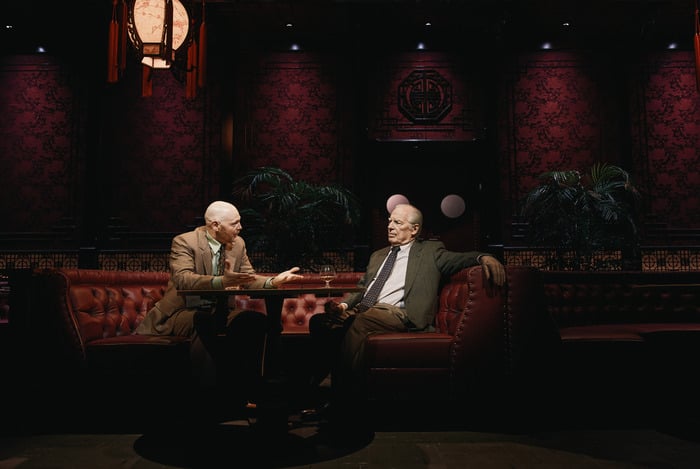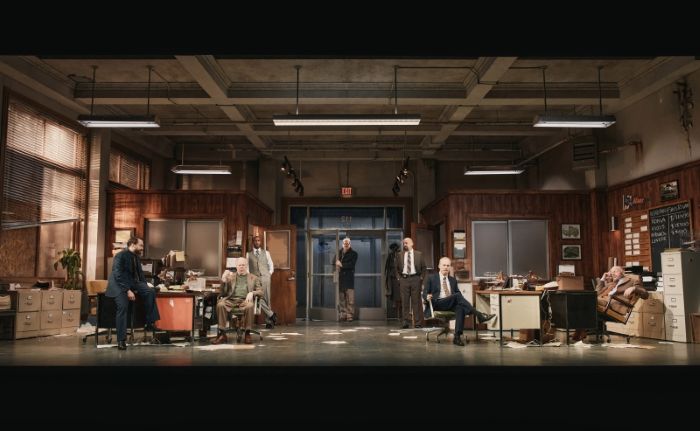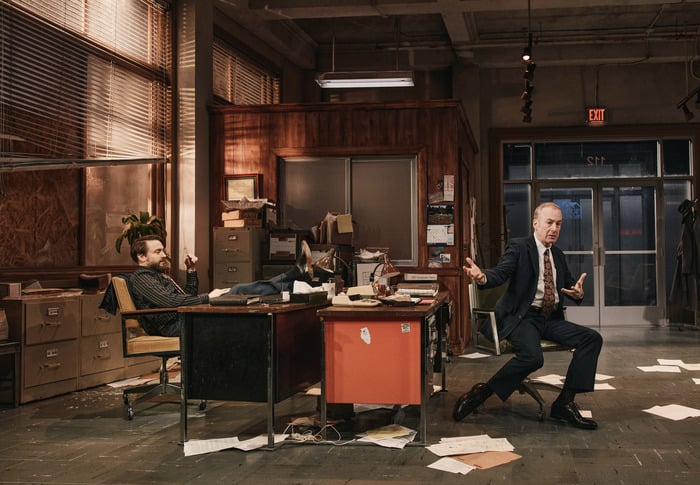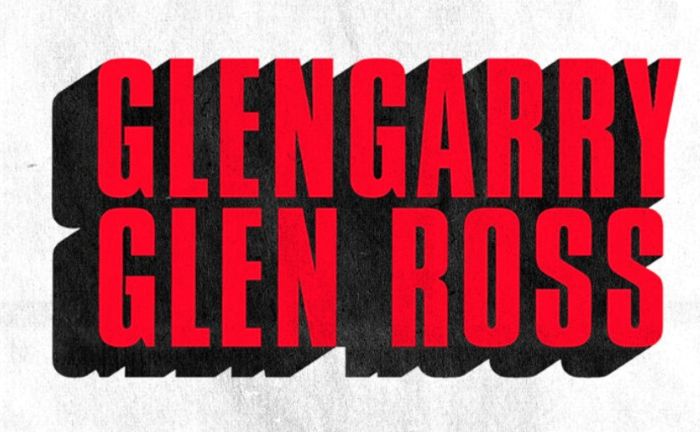David Mamet’s 1983 Pulitzer Prize-winning play Glengarry Glen Ross is back on Broadway with a cast of stars from the stage and screen, directed by Tony and Olivier winner Patrick Marber, in a new revival that’s as hilarious and scathing as ever. The dark comedy takes an inside look at the cutthroat competition and ruthless sales tactics in a Chicago real estate office, where scamming, foul language, ethnic slurs, and angry confrontations are the norm, and the need to be top in sales, win a Cadillac, or potentially lose their stressful job, results in a desperate plan by the struggling agents to break-in overnight and steal the best leads for potential buyers – selectively given by the manager to the most successful and lucrative among them – and sell them to the company’s competitors.

The two-act play opens in an elegant Chinese restaurant, where a sequence of three conversations, each between two of the characters, introduces us to the men, their gripes, their desperation to “get on the board” (a blackboard in the office with a ranking of the agents and the dollar amount of sales they made), and their general lack of ethics in achieving their goal. In the first scene, raging salesman Shelley Levene (the uproarious Bob Odenkirk, making a stellar Broadway debut), whose numbers have taken a drastic fall from his early days on top, faces off with the office manager John Williamson (a more polished and controlled Donald Webber, Jr.), who has little sympathy for Shelley but tries to maintain his calm, until he doesn’t. The following scene has the plotting and deliberately evasive Dave Moss (Bill Burr, in another sensational Broadway debut) attempting to enlist the quiet, questioning, and hesitant George Aaronow (an appropriately downcast Michael McKean) as, not just an accomplice (he already is, Moss tells him, now that he’s heard the plan), but the unwilling perpetrator of the break-in. Closing the first act is the meeting of the #1 salesman and loquacious scam artist Ricky Roma (the terrific Kieran Culkin, just off an Oscar win) philosophizing to the timid and gullible James Lingk, a stranger he targets in the restaurant (played with a fitting lack of social skills by John Pirruccello, also making his Broadway debut). It all sets the stage for what’s to come in the riotous second act.

Back at the office the next morning, the aftermath of a break-in is in evidence everywhere, from the mess of scattered papers to the missing leads and telephones, and the police interrogator Baylen (a no-nonsense Howard W. Overshown) taking the men individually into a closed room for questioning. But that only further ignites the fast-paced, furious, foul-mouthed, high-decibel confrontations and competition, with Shelley bragging about and re-enacting the big deals he closed (or thinks he did), an unexpected drop-in by James, at the request of his wife, to cancel the deal Roma convinced him to sign, revelations by John that the sales in question actually didn’t and wouldn’t go through, and total sidesplitting turmoil that wildly lambastes the toxic masculinity, one upmanship, self-aggrandizement, and ego that drive them, along with the unceasing pressure on the job and at home, and the underlying fear of failure that surfaces. The outstanding ensemble embraces and embodies it all in their unrestrained voices, demeanors, and body language, attitudes and reactions to one another (among the highlights is Roma verbally and physically putting off Baylen’s questioning until he completes his swindling of the nervous and apologetic James, in a laugh-out-loud display of comical mastery).

Scott Pask’s costumes are indicative of the business attire of the period and the personalities of the characters, with James looking more disheveled and John more upscale and professional than the others, and his set provides a telling contrast between the lavish décor of the restaurant and the deteriorating condition of the office (though the all-important blackboard tracking the performance of the salesmen and contributing untold pressure to their work is not as easily visible to the audience as it should be; its significance would be more emphatic if it were centrally placed). And Jen Schriever’s dramatically funny lighting adds to the intensity of the truculent dialogue and the rapid-fire pace of the show with sudden total blackouts at the end of its scenes.
Mamet’s exposure of ridiculously over-the-top capitalist greed, offensive racism, macho posturing, vulgar language, and exploitation of the vulnerability of others in Glengarry Glen Ross is as relevant today as it was in the ‘80s (if not more so), and George’s famous closing line sums it up in one unhappy, frustrated, and laughable denouncement of the whole mess. It’s a must-see blockbuster revival, delivered by a top-notch all-in cast, so get your tickets while you can.
Running Time: Approximately one hour and 40 minutes, including an intermission.

Glengarry Glen Ross plays through Saturday, June 28, 2025, at The Palace Theatre, 160 West 47th Street, NYC. For tickets (priced at $162.50-724.50, including fees), go online.



